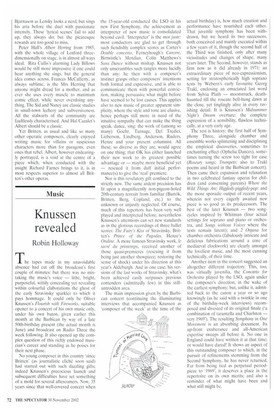Knussen revealed
Robin Holloway
The tapes made in my unavoidable absence had cut off the broadcast's first couple of minutes: but there was no mistaking the music's voice — lithe, bright, purposeful, wittily concealing yet revealing within colourful elaborations the ghost of the early Stravinsky sparkler to which it pays hommage. It could only be Oliver Knussen's Flourish with Fireworks, suitable opener to a concert of his own music only, under his own baton, given earlier this month at the Barbican by way of a late 50th-birthday present (the actual month is June) and broadcast on Radio Three the week following. It also opened up the complex question of this richly endowed musician's career and standing as he poises for their next phase.
No young composer in this country 'since Britten' (as journalistic cliché soon said) had started out with such dazzling gifts; indeed Knussen's precocious launch and subsequent difficulties have set something of a mold for several aftercomers. Now, 35 years since that well-covered concert when
the 15-year-old conducted the LSO in his new First Symphony, the achievement as interpreter of new music is consolidated beyond cavil. 'Interpreter' is the mot juste: most conductors are glad to get through such fiendishly complex scores as Carter's Double concerto. Ferneyhough's Carcere, Birtwistle's Meridian, Colin Matthews's Suns Dance without mishap. Knussen not only unscrambles such tangles more lucidly than any: he then with a composer's instinct grasps other composers' intentions both formal and expressive, and is able to communicate them with powerful conviction, making persuasive what might before have seemed to be lost causes. This applies also to new music of greater apparent simplicity, where the style and tone are elusive, hence perhaps still more in need of the intuitive sympathy that can make the thing speak, dance, sing: the work of (among so many) Goehr, Turnage, Del Tredici, Lieberson, Lindberg, Anderson, Ruders, Henze and your present columnist. All these, so diverse as they are, would agree on one thing; that OK has either launched their new work to its greatest possible advantage or — maybe more beneficial yet — rescued it from duff initial performance(s) to give the 'real' premiere.
Nor is this revelatory gift confined to the strictly new. The same ardent precision has lit upon a magnificently non-pigeon-holed 20th-century terrain from familiar (Bartok, Britten. Berg, Copland, etc.) to the unknown or unjustly neglected. Of course, much of this repertory has been very well played and interpreted before; nevertheless Knussen's attentions can set new standards as in the glorious recordings of three ballet scores: The Fairy's Kiss of Stravinsky, Britten's Prince of the Pagodas, Henze's Ondine. A more famous Stravinsky work, le sacre: du printernps, received another of those quasi-premieres (rescuing it from being just another showpiece; restoring the sense of shock) under his direction at this year's Aldeburgh. And in one case, his versions of the last works of Stravinsky, what's been achieved easily surpasses previous contenders (admittedly few) in this stilluntrodden area.
The main impression given by the Barbican concert (continuing the illuminating interviews that accompanied Knussen as 'composer of the week' at the time of the
actual birthday) is, how much creation and performance have nourished each other, That juvenile symphony has been withdrawn, but we heard its two successors, both conceived and mainly executed within a few years of it, though the second half of the Third was finished, only after many vicissitudes and changes of shape, many years later. The Second, however, stands as firm now as it did already in 1971: an extraordinary piece of neo-expressionism, setting for stratospherically high soprano texts by Webern's early favourite Georg Trakl, enclosing an emaciated last word from Sylvia Plath — moonstruck, deathhaunted till the roseate bell-hung dawn at the close, yet tinglingly alive in every ravishing detail. It is Knussen's Midsummer Night's Dream overture: the complete expression of a sensibility, flawless technically, at a very early age.
The rest is history: the first half of Symphony Three, alongside chamber and ensemble works splintering and disciplining the empirical discoveries, sometimes to enchanting effect (Ophelia Dances), sometimes turning the screw too tight for ease (Roseary songs; Trumpets; also to Trak' poems and heard in the Barbican concert). Then came their expansion and relaxation in two celebrated fantasy operas for children (and consenting parents) Where the Wild Things Are; Higgledy-piggledy-pop: and the more sporadic output of recent years, wherein not every eagerly awaited new piece is so good as its predecessors. The best of the later Knussen — two songcycles inspired by Whitman (four actual settings for soprano and piano or orchestra, and Songs without Voices where the texts remain latent); and 2 Organa for chamber orchestra (fabulously intricate and delicious fabrications around a core of mediaeval clockwork) are clearly amongst the loveliest music, and the most cunning technically, of their time.
Another item in the concert suggested an altogether different trajectory. This, too, was virtually juvenilia, the Concerto for Orchestra played by the LSO, again under the composer's direction, in the wake of the earliest symphony; but, unlike it, admitted back to the canon a year or so ago knowingly (as he said with a twinkle in one of the birthday-week interviews) recomposed and divested of its original finale Ca combination of tarantella and Charlston — very 1969'). The resulting Symphony in One Movement is an absorbing document. Its up-front exuberance and all-American expertise sweeps all before it. No one in England could have written it at that time; or would have dared? It shows an aspect of this outstanding composer to which, in the pursuit of refinements stemming from the Second Symphony, he has never returned. Far from being tied as perpetual periodpiece to '1969', it deserves a place in the repertoire on its own merits; and also a reminder of what might have been and what still might be.


























































































 Previous page
Previous page